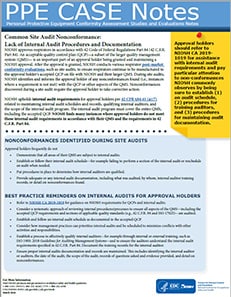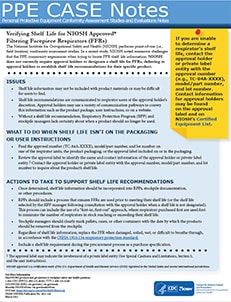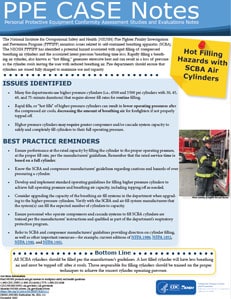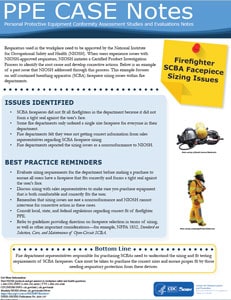PPE CASE Notes
Personal Protective Equipment Conformity Assessment Studies and Evaluations (PPE CASE) Notes provide a summary of findings from our post-market personal protective equipment tests, evaluations, and investigations. These one-page summaries inform respirator users about common themes or trends we found and provide best practice reminders to prevent future occurrences.

Common Site Audit Nonconformance: Lack of Internal Audit Procedures and Documentation
NIOSH conducts various respirator post-market conformity evaluations, including site audits, to ensure respirators continue to be manufactured to an approval holder’s accepted quality control plan (QCP) and quality management system (QMS). During site audits, NIOSH identifies and informs approval holders of any nonconformances with their QCP or other aspects of their QMS. NIOSH has found many instances where approval holders do not meet internal audit requirements in accordance with their QMS and the requirements in 42 Code of Federal Regulations Part 84. This PPE Case Notes details nonconformances identified during site audits and best practices approval holders
should follow for internal audits.

Verifying Shelf Life for NIOSH Approved® Filtering Facepiece Respirators (FFRs)
DHHS (NIOSH) Publication No. 2023-128
The National Institute for Occupational Safety and Health (NIOSH) performs point-of-use (i.e., field location) conformity assessment studies. In a recent study, NIOSH noted numerous challenges that the PPE community experiences when trying to locate filtering facepiece respirator (FFR) shelf life information. NIOSH does not currently require approval holders to designate a shelf life for FFRs, deferring to approval holders to establish shelf life recommendations for their specific product. This PPE CASE Notes details respirator shelf life issues identified by NIOSH, what to do when shelf life information isn’t readily available, and actions that can be taken to support NIOSH’s shelf life recommendations for FFRs.

Hot Filling Hazards with SCBA Air Cylinders
DHHS (NIOSH) Publication No. 2021-111
The National Institute for Occupational Safety and Health (NIOSH) Fire Fighter Fatality Investigation and Prevention Program (FFFIPP) monitors issues related to self-contained breathing apparatus (SCBA). The NIOSH FFFIPP has identified a potential hazard associated with rapid filling of compressed breathing air cylinders and the associated latent pressure/breathing time loss. Rapidly filling a breathing air cylinder, also known as “hot filling,” generates excessive heat and can result in a loss of pressure as the cylinder cools leaving the user with reduced breathing air. Fire departments should ensure that cylinders are stored fully charged to maximize use and capacity.

Firefighter SCBA Facepiece Sizing Issues
DHHS (NIOSH) Publication No. 2020-107
Respirators used in the workplace need to be approved by the National Institute for Occupational Safety and Health (NIOSH). When users experience issues with NIOSH-approved respirators, NIOSH initiates a Certified Product Investigation Process to identify the root cause and develop corrective actions. Below is an example of a past issue that NIOSH addressed through this process. This example focuses on self-contained breathing apparatus (SCBA) facepiece sizing issues within fire departments.